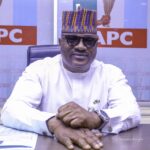Nigerian Senator, Godswill Akpabio was recently elected as President of the upper chamber of Nigeria’s National Assembly.
Akpabio, a former governor of Akwa Ibom State and lawmaker from Akwa Ibom North West emerged winner after polling 63 votes to defeat his opponent, Abdulaziz Yari, former Zamfara State governor, who got 46 votes.
The result was announced by the clerk of the National Assembly, Sani Tambuwal.
According to her, 107 senators voted.
Akpabio was the anointed candidate of the All Progressives Congress (APC) for the seat of number 3 citizen, but was challenged by Yari, who is also of the APC.
Akpabio was nominated by Ali Ndume (Borno) and seconded by Adeola Olamilekan (Ogun); while Yari was nominated by Elisha Abbo (Adamawa) and seconded by Jimoh Ibrahim.
Below are five things to know about the new Senate President:
EARLY LIFE
Akpabio, an Indigene of Akwa Ibom, was born on December 9, 1962. He was raised by his mother after the death of his father at a very tender age.
EDUCATION
He attended Methodist Primary School, Ukana, Essien Udim LGA, Akwa Ibom State; the Federal Government College, Port Harcourt, Rivers State; and the University of Calabar, Cross River State, where he obtained a Degree in Law.
CAREER AND EMPLOYMENT
He had a brief stint as a teacher and as an associate partner in a law firm in Nigeria. He also worked with EMIS Telecoms Limited, a wireless telecommunications company in Lagos, Nigeria. In 2002, he rose to the position of the Managing Director/Chief Executive Officer of the company. He had earlier served as the National Publicity Secretary of the Association of Telecommunication Companies in Nigeria, (ATCOM), while a director of EMIS.
APPOINTMENTS AND POLITICS
In 2002, he was appointed Honourable Commissioner for Petroleum and Natural Resources by the then Governor Obong Victor Attah in Akwa Ibom State. Between 2002 and 2006, he served as a Commissioner in three key ministries: Petroleum and Natural Resources, Local Government and Chieftaincy Affairs, as well as Lands and Housing
In 2006, he aspired for the governorship of Akwa Ibom State in a contested primary election and defeated 57 other aspirants to emerge the candidate of the Peoples Democratic Party (PDP).
His campaign with the slogan, “let God’s will be done” received mass support and was elected Governor in 2007. He was re-elected for a second term in office in 2011.
In 2013, he was elected Chairman of the newly formed PDP Governors Forum. In 2015, he contested and won the Senate seat.
Akpabio was nominated for the position of the Senate Minority Leader by the South-South caucus of the PDP, ratified by the caucus of the PDP. The PDP lost the majority to the APC in the 2015 general elections.
In August 2018, he resigned as the Senate Minority Leader, after he had announced his defection to the APC.
In July 2019, he was nominated by President Muhammadu Buhari and screened by the Nigerian Senate for a Ministerial appointment. In June 2022, Akpabio resigned from his position as Minister for Niger Delta Affairs to contest in the presidential primaries of the ruling APC but stepped down on the night of the primaries for the eventual winner President Bola Ahmed Tinubu.
A few days after the presidential primaries, he emerged as the Senatorial candidate for Akwa Ibom North-West Senatorial District. However, it was fraught with accusations of foul play by stakeholders of the party in the State. He went on to defeat his closest rival Emmanuel Enoidem of the PDP to become the senator-elect in the 2023 general elections polling 115,401 votes, against Enoidem’s 69,838 votes.
CORRUPTION ALLEGATIONS
Akpabio was under investigation by the Economic and Financial Crimes Commission (EFCC) on accusations that he diverted over N100 billion from Akwa Ibom State during his time as governor (2007-2015).
However, no charges have been filed. A lawyer, Leo Ekpenyong who also accused Akpabio of corruption, was later arrainged by the police in court for defamation.
In May 2020, Akpabio was summoned by members of the House of Representatives over the misappropriation of 40 billion Naira.
***
Source: Daily Trust





